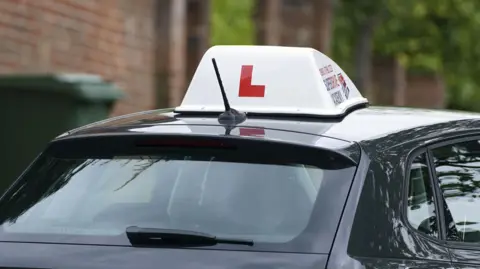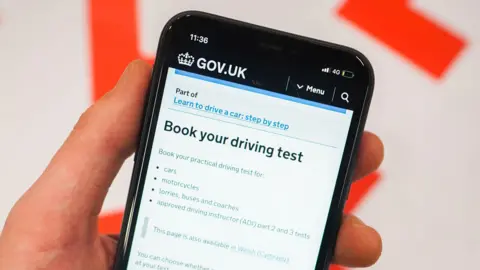'Driving test waits are so long because examiners don't earn enough'
 PA Media
PA MediaClearing the backlog in driving test wait times relies on improving pay and conditions for examiners, industry professionals have said.
The government has pledged to provide 10,000 extra practical test slots each month, after transport secretary Heidi Alexander said the average wait time of six months was "totally unacceptable." She promised to double the capacity to train new examiners.
Yet Craig Harris from the Sheffield and District Driving Instructors Association said the difficulties in recruiting and retaining examiners had arisen because they could make more money teaching learners than assessing them.
He said: "Examiners used to make a decent wage. Now, instructors make their wages in 14 hours, so why would anyone go and work 37 and a half hours?"
'Proper investment'
The Driver and Vehicle Standards Agency (DVSA), a government body, recruits examiners, who are classed as civil servants and therefore unable to speak to the media.
Some of them are represented by the Public and Commercial Services (PCS) union, which said there needed to be "long-term investment into training and staffing" to achieve manageable waiting times.
"A long-term solution to mitigating driving test waiting times can be achieved through proper investment into DVSA resources and employees," a PCS spokesperson said.
"These include a return to a substantive [permanent or long-term] contract where weekend working is optional and paid properly, at an overtime rate."
The DVSA announced last week it would reintroduce overtime pay, and said it would ask staff in other roles who are qualified examiners to hold tests.
It is all in an effort to clear the backlog of test-ready learners by summer 2026 and get the average wait down to seven weeks.
 PA Media
PA MediaMr Harris said similar attempts to reduce waiting lists have failed previously, as a "big area of recruitment has gone".
"A heck of a lot of instructors used to be recruited to be examiners, as we thought we'd have an easier life there, but that's changed now," he said.
A quick search for examiner roles through the DVSA shows a typical salary to be just above £28,000 before tax.
Driving instructors tend to be self-employed and work a range of hours, but full-time instructors typically earned up to £40,000 and "even exceeded that" in 2023, according to the AA.
The DVSA did not comment on its working conditions and pay.
It noted customers were "not seeing the immediate effect" of measures announced last year, which aimed to recruit 450 examiners and give higher penalties for short-notice cancellation.
Pauline Reeves, DVSA's director of driver services, said there had been "significant progress" on the original plan and the recent announcement would help "accelerate" that plan.
'Pressure has mounted'
Some learner drivers are taking tests elsewhere in the country due to a lack of slots available in their area.
Gwydion Elliot, a biosciences student at the University of Sheffield, is set to take his practical test in Wakefield in late September.
"If it's past six months they don't list it, and there was nothing available for Sheffield test centres at all," he said.
Learners can only book practical tests six months in advance, and they wait on average 22 weeks and three days to secure a test.
"The pressure has really mounted," Mr Elliot added.
"It's hard to sit in a test with the knowledge that if you fail, you might be waiting another six months".
 Gwydion Elliot
Gwydion ElliotHe said he hoped to find work as an ecologist which would involve visiting field sites far from public transport links.
"I'll have a much easier job finding a job in that sector once I can drive," he said.
Instructors are also feeling the pressure of supporting their students through such a difficult challenge, Mr Harris said.
"I consider our prices below average at around £35 an hour, but that is still not cheap.
"If they then choose to only take occasional lessons while they wait, that makes it hard for us to fill our diary.
"The worst thing is, if they fail a test, they've got a six-month wait again."
Listen to highlights from South Yorkshire on BBC Sounds, catch up with the latest episode of Look North
